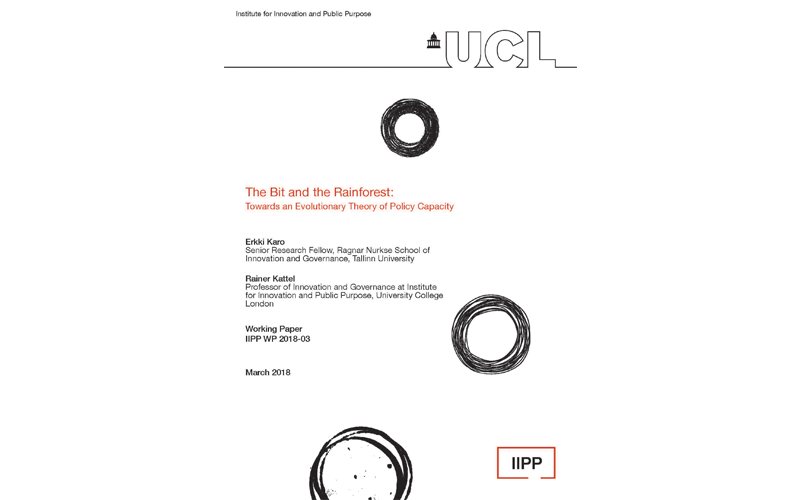The Bit and the Rainforest: Towards an Evolutionary Theory of Policy Capacity

16 March 2018
UCL Institute for Innovation and Public Purpose (IIPP) Working Paper Series: IIPP WP 2018-03
Authors
- Erkki Karo | Senior Research Fellow, Ragnar Nurkse School of Innovation and Governance, Tallinn University of Technology
- Rainer Kattel | Deputy Director, Professor of Innovation and Public Governance, UCL Institute for Innovation and Public Purpose
Reference
Karo, E, Kattel, R. (2018). The Bit and the Rainforest: Towards an Evolutionary Theory of Policy Capacity. UCL Institute for Innovation and Public Purpose, IIPP Working Paper Series (IIPP WP 2018-03). http://www.ucl.ac.uk/bartlett/public-purpose/wp2018-03
Abstract
Richard Nelson showed in his seminal The Moon and the Ghetto (1977) that there are some socio-economic challenges that cannot be solved solely through advances in technology – we have the know-how that gets us to the moon but not the know-how to ‘solve’ the ghetto. Some challenges require different kinds of knowledge and expertise from the public sector. Following Nelson, we can argue that today our societies are increasingly apt in creating and using data (bits), yet data alone will not save the rainforests from climate change. In other words, directing or steering innovations and know-how to solve ‘wicked’ or grand challenges requires a different approach to policy making. In this paper, we propose an evolutionary analytical approach to policy capacity with a specific focus on policy domains where uncertainty and need for policy innovations is a central concern for effective policies. From an evolutionary perspective, the core elements of policy capacity are: a) organizational routines and their varieties, b) search and selection and the endogenous and exogenous sources of novelty creation, c) selection and feedback environments. We operationalize these elements and illustrate the value of the evolutionary analytical perspective through a discussion of the evolution of science, technology and innovation (STI) policy capacities of three Asian Tigers: South Korea, Taiwan and Singapore.
 Close
Close

